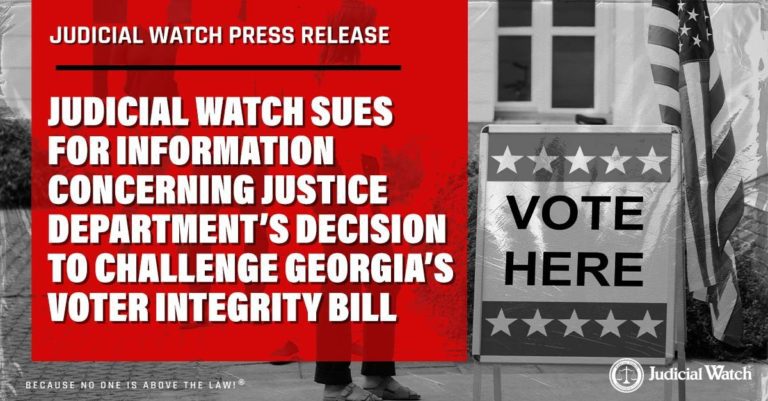

Judicial Watch Sues for Information Concerning Justice Department’s Decision to Challenge Georgia’s Voter Integrity Bill


(Washington, DC) – Judicial Watch announced today that it filed a Freedom of Information Act (FOIA) lawsuit against the U.S. Department of Justice (DOJ) for records of communications between the DOJ and various left-wing groups and individuals concerning the DOJ’s decision to challenge Georgia’s election integrity law (Judicial Watch, Inc. v. U.S. Department of Justice (No. 1:21-cv-02427)).
Judicial Watch filed the lawsuit on September 15, 2021, in the U.S. District Court for the District of Columbia, after the DOJ failed to respond to a July 26, 2021, FOIA request to the Justice Department’s Voting Section of the Civil Rights Division for the following records:
- All documents and communications between (1) the U.S. Department of Justice Civil Rights Division, or any of their officers, employees, members, agents, or affiliates, and (2) any of the following people and organizations, including any of their officers, members, agents, parent organizations, affiliated entities, branches, subordinate organizations, or chapters, concerning the U.S. Department of Justice’s Voting Rights Act Section 2 lawsuit against the State of Georgia, et al., in the Northern District of Georgia, Civ. No. 21-2575:
ACLU Foundation of Georgia, American Civil Liberties Union, League of Women Voters, Brennan Center for Justice, Lawyers Committee for Civil Rights Under Law, Common Cause, NAACP, Georgia State Conference of the NAACP, Campaign Legal Center, Fair Fight, Fair Fight Action, Stacy Abrams, Perkins Coie LLP, Marc Elias.
The Justice Department’s lawsuit challenging Georgia’s election law asks the court to strike down major parts of the act, including strengthened voter ID requirements for voting by mail.
“The leftists who control the Justice Department have a long record of working hand in glove with extremist and partisan interest groups who oppose any efforts to make it harder to steal votes and elections,” said Judicial Watch President Tom Fitton.
A week after the DOJ filed its lawsuit against Georgia, on July 1 of this year, the U.S. Supreme Court upheld two Arizona voting provisions that Democrats and civil rights groups had challenged as disproportionately burdening minority voters. Judicial Watch and the Allied Educational Foundation filed amici curiae (friends of the court) briefs in support of Arizona’s law. The court’s decision is what Fitton called “a knockout blow to the Left’s tsunami of harassing lawsuits challenging virtually any effort by any state to modestly increase the security of elections and minimize the impact of voter fraud.” In response to the Supreme Court ruling, the Left appears to have become, in Fitton’s words, “desperate to short circuit the efforts of states to implement security measures such as voter ID.”
Judicial Watch remains front and center in the fight for clean elections, from its historic election integrity victory in L.A. County, to the current election-related lawsuits in North Carolina, Pennsylvania and Colorado.
In 2018, the Supreme Court upheld a voter-roll cleanup program that resulted from a Judicial Watch settlement of a federal lawsuit with Ohio. Kentucky began cleaning up hundreds of thousands of old registrations in 2019 after it too entered into a consent decree in 2018 to end another Judicial Watch lawsuit.
Based on this research, in 2020, a federal court ordered the State of Maryland to produce complete voter registration records for Montgomery County that include the registered voters’ dates of birth.
In September 2020, Judicial Watch filed a lawsuit on behalf of the Illinois Conservative Union (ICU) and three of its officers, after Illinois state officials refused to allow them to obtain a copy of the state’s voter registration database. In June 2021, a federal court ruled the lawsuit could proceed.
Judicial Watch Attorney Robert Popper is the director of Judicial Watch’s clean elections initiative.
###















